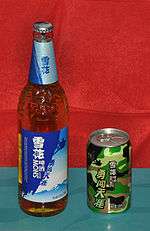Snow (beer)
Snow (simplified Chinese: 雪花啤酒, literally Snowflake beer) is a brand of lager beer from Shenyang, China. It is brewed by CR Snow, that (until October 2016) was a joint venture between SABMiller and China Resources Enterprises. When Snow was first released in 1993 it was produced by three breweries. As of 2014, CRSB was the largest brewing company in China with over 90 breweries across the country, brewing more than 100 million hectolitres of Snow every year.[1]

By 2016, SABMiller owned 49 percent of Snow Beer. Before acquiring SABMiller, Anheuser-Busch InBev had agreed to sell its interests in Snow to China Resources Enterprise (for $1.6 billion) to satisfy regulators.[2]
In 2018 Heineken signed an agreement with China Resources Enterprises to purchase a 40% stake into the company.[3]
Snow beer is the best-selling beer brand in the world,[4][5] despite largely being sold only in China.[6][7] However, Snow includes a large range of beers; when Budweiser, Bud Light and the other members of the Budweiser family are counted as a single brand, they easily top the sales charts with over 100 million hectoliters a year.[8]
Shenyang Snow Beer
Manchuria Beer (Japanese: 満州麦酒), established in 1934 by Dai Nippon Beer (Japanese: 大日本麦酒), and Kirin Beer jointly, completed its second factory in 1936 at the current address of Jianshe East Road (Chinese: 建设东路), Tiexi District, Shenyang City, at Xinggong North Street. [9] This factory became Liaoning Province Brewing Company in 1945, Shenyang Beer Company in 1949, and came to be known as "Snow Beer" (Chinese: 雪花啤酒) from 1957. In 1997, China Resources Enterprise acquired this factory as part of Huarun Snow Beer Company (China). It has since been known as Shenyang Huarun Snow Beer (Chinese: 沈阳华润雪花啤酒). [10]
References
- "Pub Quiz: What's the World's Best-Selling Beer? | TIME.com". Newsfeed.time.com. 2011-08-24. Retrieved 2017-01-01.
- Phil Serafino; Rachel Chang (2016-04-19). "AB InBev Accepts Asahi Offer to Buy Grolsch, Peroni and Meantime Beer Brands". Bloomberg.com. Retrieved 3 February 2017.
- https://www.nu.nl/economie/5396297/heineken-tekent-miljardenovereenkomst-met-grootste-chinese-brouwer.html
- "10 biggest selling beer brands globally". Business Insider. 2016-05-09. Retrieved 2017-01-01.
- The Best-Selling Beer in the World Isn’t What You Think. bloomberg.com. Retrieved 22 May 2015
- Riley, Charles. "Snow - The world's most popular beer is ... - CNNMoney". Money.cnn.com. Retrieved 2017-01-01.
- Doug Bolton. "The world's top-selling beers aren't what you would guess". The Independent. Retrieved 2017-01-01.
- "China's Snow jumps Bud Light to be world No 1". Reuters. 2009-03-31. Retrieved 2017-01-01.
- Manchria Beer (The History o Kirin Group) (in Japanese)
- Visiting and Researching Shenyang Snow Beer's Old Factory (in Chinese)
External links
- Official website (in Chinese)